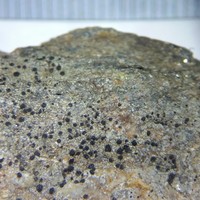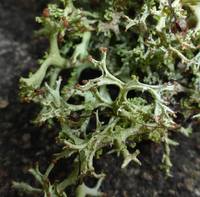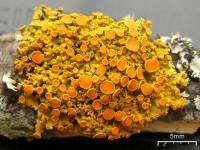Welcome to the "Lichens of North Carolina" website! |
 Clauzadea monticola Clauzade's Mountain Disc Lichen | Peltigera rufescens Rufous Pelt Lichen |  Cladonia multiformis Shape-shifting Pixie Lichen |  Xanthomendoza hasseana Poplar Sunburst Lichen |
Aims of this website Our intention with this website is to shine a brighter light on lichens, lichenicolous fungi and allied fungi. We have two main aims in this regard: • Provide information to people who are interested in learning more about lichens. This website aims to provide a compendium of all of the lichen species recorded in North Carolina, with pictures of each species, information on species identification, general information about their distribution in the state (by county), their relative abundance in the state, their seasonal occurrence in the state, their habitats, as well as additional comments on the species (such as notable facts, taxonomic issues, or population trends). County maps of occurrence are provided for each species. • Build a base of public support for the conservation of lichens and their habitats in North Carolina. We want to make clear the situation that faces lichens and other species in terms of their continued survival in our state and share this information to help guide conservation decisions made by individual land-owners, conservation organizations, governmental agencies, and particularly by the public. To accomplish these goals, especially where they involve lichens or other species not usually given much public attention, we need to make our case from the best evidence we can muster, placing the plight of lichens well within the context of the larger world of which both we and they are an important part. How to navigate the website To see a species account, start typing the scientific name in the Search Scientific Name field or, if a common name exists, the common name is the Search Common Name field. Names of species appear on the screen; click on the correct species that you want, so that the full name appears in the field box; then click Find (to the right). Once you are viewing a species account you can get to another species (within the same Family) by clicking the down arrow under the scientific name, where the box shows other members in the Family; click on the species of interest. |
|
How to Identify a lichen, lichenicolous fungus or allied fungus While we will eventually have identification tips included in the Species Accounts for all species that occur in the state, there are a number of other identification guides that already exist and are specifically tailored for identifying an unknown lichen. Information on these resources is included in the Identification Guides tab on the main menu bar located at the top of the Home Page. How to become a Citizen Scientist One of our main aims is to involve the public in documenting the distribution and habitat associations of the state’s lichen flora. We therefore welcome records from anyone wishes to submit for species observed in North Carolina. Information on how to submit records and the details we need to vet the records are included in the Citizen Science tab on the main menu bar located at the top of the Home Page. Statistics Number of records: 15,019 Number of records by Record Type: Number of NC Lichens (lichenized fungi): 1,418 Number of NC taxa: 1,571
DISCLAIMER
The above numbers are based on a combination of specimen citations in the published literature and specimen records in the Lichen Portal (Lichen Portal); some Lichen Portal records may not be accurately identified. Therefore, the above record statistics may be overestimated. Efforts are underway to investigate questionable records and make corrections as necessary. The NC taxa based on literature reports presents a minimum estimate of the NC lichen biodiversity, while the total taxa may be a maximum estimate as some Lichen Portal records may be inaccurate. |
| Clicking on a county returns a list of its species. | |
 | |
| Citation: Perlmutter, G., J. Hollinger, and T. Howard. 2026. Lichens of North Carolina [Internet]. Raleigh (NC): North Carolina Biodiversity Project and North Carolina State Parks. Available from https://auth1.dpr.ncparks.gov/lichen/index.php. |